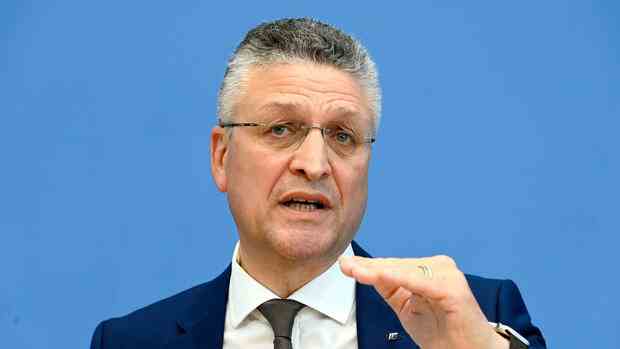The RKI President wants to resign from office on April 1st.
(Photo: IMAGO/Future Image)
Berlin After almost eight years at the head of the Robert Koch Institute (RKI), President Lothar Wieler has decided to resign. The Federal Ministry of Health and the RKI announced on Wednesday that he was leaving the RKI at his own request on April 1st.
Wieler will devote himself to “new tasks in research and teaching”. The step was taken in agreement with Health Minister Karl Lauterbach (SPD). Deputy Lars Schaade will take over Wieler’s duties for a transitional period.
Wieler was in the public eye several times, especially during the coronavirus pandemic, and appeared regularly in front of the press together with Lauterbach and his predecessor Jens Spahn (CDU).
Lauterbach certified Wieler’s “lasting and outstanding merits in overcoming the pandemic for the country” and emphasized: “Without Professor Wieler, Germany would have come through this pandemic much worse.”
Top jobs of the day
Find the best jobs now and
be notified by email.
However, the cooperation between the two was not always as smooth as the words suggest. About a year ago there was a crunch between Lauterbach and Wieler, some even suspected a rift. Wieler’s institute insisted on “maximum contact restrictions” in recommendations, while the federal and state governments were considering significantly less stringent measures.
When asked about this at the federal press conference, Lauterbach said at the time: “Here came the question of whether I still stand by Mr. Wieler.” That could be easily answered, “otherwise he wouldn’t be sitting here”. Nevertheless, the relationship was considered to be strained from then on, to which a decision by the institute a few weeks later also contributed.
“Factual and appreciative”
A year ago, the RKI surprisingly shortened the recovered status from six to three months, triggering a wave of criticism. Lauterbach then decided to withdraw this competence from the institute.
Despite all the differences, Lauterbach stuck to Wieler. From coalition circles it is said that Wieler “was someone who didn’t mince his words”. The cooperation was nevertheless “very factual, very appreciative”. The Ministry of Health was always happy to have Wieler.
Others say the reason for the resignation was more the “gluttonous role” that the post entailed. Especially in the early days of the pandemic, Wieler appeared weekly at the federal press conference to explain the corona situation.
Wieler, who was previously little known to the public, had to get used to this role. “It was always clear that he would do something different when the pandemic came to an end,” says a companion.
In the debate about protective measures for the population, Wieler took a stricter stance than many others, which brought him criticism from some quarters, including the FDP, which called for Wieler’s resignation several times. The reason for the criticism was also the lack of digitization of the institute, which Wieler was repeatedly accused of.
The health policy spokesman for the Union faction, Tino Sorge (CDU), on the other hand, tells the Handelsblatt that he has always experienced Wieler as a critical and open-minded discussion partner. “It was good that he was at the head of the RKI in recent years. We all owe him a great debt of gratitude.”
Wieler helped shape difficult decisions in the fight against corona – often under the most adverse conditions: “Ultimate time pressure, incomplete information and rapidly increasing numbers,” said Sorge. “The hostility and threats that he and his family had to endure are hard to imagine.”
More: The mask requirement is about to end
